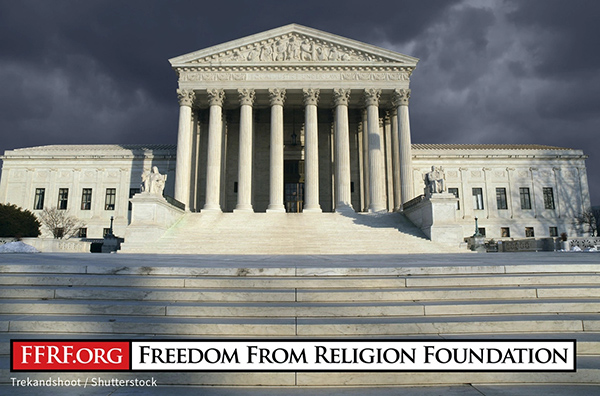
The U.S. Supreme Court must dismiss a manufactured case of a Colorado business so that religious discrimination is thwarted, the Freedom From Religion Foundation insists in an amicus brief.
The state/church watchdog has filed a friend-of-the-court brief in a free speech case involving a Colorado business owner who says she would like to start designing wedding websites and claims that she cannot do so because the Colorado Anti-Discrimination Act has put her in a quandary: Due to her Christian religion, she can’t design wedding websites for same-sex couples; the law prohibits her from refusing to design for such couples. The 10th U.S. Circuit Court of Appeals ruled in favor of the state of Colorado and found that her free speech rights are not violated by the law. Other leading secular groups such as the Center For Inquiry, the American Humanist Association and American Atheists have signed on to FFRF’s brief.
The Constitution requires that federal courts only decide actual cases and controversies. In this pre-enforcement challenge, the wannabe Colorado wedding web designer seeks to sidestep that constitutional requirement, FFRF contends. She has never actually designed wedding websites and therefore has never been subject to a complaint under the Colorado Anti-Discrimination Act.
“Lorie Smith may dislike that loving same-sex couples in the United States are afforded the right to marry,” states the brief. “Her religious disagreement with marriage equality, however, does not magically transform a speculative chain of events into an imminent injury. 303 Creative has manufactured a controversy and cannot demonstrate that it is under the threat of enforcement of the Colorado Anti-Discrimination Act.”
FFRF reveals the real reason for 303 Creative’s appeal before the Supreme Court.
“The ultimate prize for the litigants is not to engage in particular conduct,” says the brief. “They are after a court decision. The ability to actually engage in a business venture appears to be a secondary, if not nonexistent, objective.”
Another major concern that FFRF has is about the Supreme Court manipulating what cases it is able to hear. This court must apply jurisdictional doctrines uniformly, FFRF urges, otherwise it provides special access to courts to preferred litigants.
“What is concerning to amici, and to those watching the court, is whether the court will apply its jurisdictional framework in the same manner to all litigants,” the brief contends. “The same access to courts must be provided to all citizens, regardless of whether they identify as Christian, Muslim, Jewish or atheist.”
And FFRF is deeply troubled about what a ruling in favor of the company will mean: It will quite certainly result in religious discrimination being ratcheted up.
“If the Supreme Court sanctions discrimination by businesses as a matter of free speech, one likely result will be an increased amount of religious discrimination,” the brief asserts. “The court would then cause significant harm by sanctioning discrimination against religious and nonreligious customers by businesses.”
Such a ruling may have consequences that the current court is not envisioning at all.
“If the court reaches the merits and rules in favor of 303 Creative, it will undoubtedly create religious disharmony and create a catalyst for religious discrimination,” the brief emphasizes. “In the years to come, businesses may begin discriminating against couples seeking to marry because of their religion or lack of religion. Given national demographic changes, couples seeking traditional religious weddings may in fact be subject to increasing discrimination.”
Because 303 Creative lacks standing, FFRF concludes, the Supreme Court should dismiss the appeal for lack of jurisdiction. Alternatively, it should affirm the ruling of the 10th Circuit.
Patrick Elliott, Senior Counsel for FFRF, is the counsel of record for the brief. FFRF thanks Chloe Garcia, FFRF’s summer law student intern, for her assistance on the brief. You can read the entire brief here.
The Freedom From Religion Foundation is the largest national association of freethinkers, representing atheists, agnostics, and others who form their opinions about religion based on reason, rather than faith, tradition or authority. It has more than 38,000 members across every state and the District of Columbia, including 1,200 active members in Colorado, with chapters in Denver and Colorado Springs. More than 10 percent of FFRF’s members are LGBTQ. FFRF supports civil rights protections for LGBTQ Americans and opposes the radical redefinition of “religious freedom” as the right to impose one’s religious beliefs on others.

